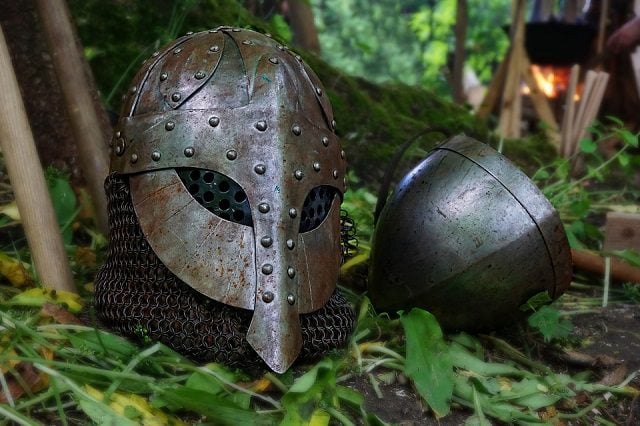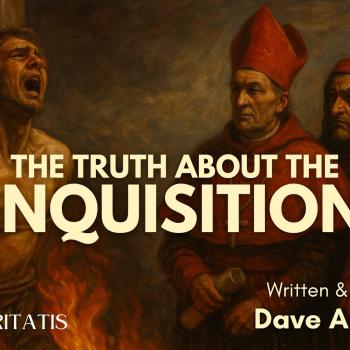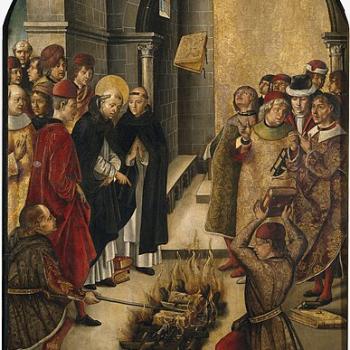
Photograph by “blitzmaerker” (June 2016) [Pixabay / CC0 public domain]
***
The following exchanges took place on Steve Ray’s public bulletin board, on 28-29 February 2000. The words of a person (“Walt”) who vigorously disagreed with Mark will be in blue. Words of other persons will be in green.
***
How does one defend Catholicism in view of the Crusades and its slaughter?
How do you defend the Allied assault on continental Europe during World War II? Oh sure, you will say that Europe was occupied territory dominated by a foreign power, but does that really justify the sorts of atrocities, civilian deaths, and often racism that characterized so much Allied activity? I mean, just look at the fire bombing of Dresden. Just look at our neglect to bomb the rail lines to Auschwitz. Just look at our neglect of the Warsaw Uprising Reprisals. Just look at the mass slaughter of innocent people at Hiroshima and Nagasaki. Not only that, we hypocritically entered into an alliance with Stalin, one of the greatest butchers in history, to press our “just war” effort against Hitler. So obviously, there is no way at all to justify the so-called “Allied Cause.” The whole thing must have been an entirely self-serving hypocritical effort with a thin veneer of “God and country” painted over it to give it a semblance of piety.
Please read this description of WWII carefully several times and then replace “WWII” with “the Crusades” and Hitler with “Saladin” to get some sense of the way a medieval European would regard the assumptions at the back of your question. The Crusades involved nasty slaughter because war usually does this. There were terrible crimes committed during the Crusades just as there there were terrible crimes committed by the Allies. But the Crusades were fundamentally seen by Europeans as a defensive war to liberate Christian lands from Muslim oppression, just as WWII was seen as a defensive war to liberate Europe from Nazi oppression. (Not for nothing did Eisenhower entitle his memoirs Crusade in Europe). It is also worth noting that Muslim conquest proceeded to gobble up all of Christian North Africa and Spain, as well as make it as far as Vienna. The last major assault on Christendom was in 1689. For some reason, Europe regarded Islam as a hostile power and sent troops to try to stop the conquest and roll it back.
We, who just watched our planes blow up Serbs to “liberate” Kosovo have little room to wring our hands.
Come on, Mark — you can’t compare the Byzantine Emperor — or even Saladin — with Hitler.
Sure I can. Both were occupying powers seen as a threat to Europe. I don’t mean that Saladin was a genocidal maniac. But I do mean that Islam posed the gravest military threat to a Europe already surrounded by military threats (from Norsemen and Magyars too).
My point is that modernity has somehow gotten the idea that the Crusades were wars of conquest against happy Arab nomads who were minding their own business. In fact, they were seen as wars of liberation against an invader who not only conquered but imposed an alien religion (and, it should be noted, a heretical religion in the eyes of medievals. Mohammed was perceived, even by Dante, as a Christian heretic, not as a heathen).
Would you care to demonstrate that the Crusades met all the requirements for a “just war”?
I don’t claim they did. What I am trying to show is that the Crusades were seen by those prosecuting them as a legitimate defense against a mortal threat.
Why is it so difficult for Christians to admit that individual Christians in the past have done some remarkably foolish and evil things, sometimes with the knowledge, sometimes the permission, or even sometimes with the encouragement of the institutional Church?
I did acknowledge that. I think the slaughter of Jews in the Rhineland was every bit as reprehensible as the bombing of Dresden. I simply do not say that this was “all there really was” to the Crusades or to the Allied effort. Most people that post questions such as the one that started this thread are people who have almost no actual knowledge of the enormous complexities behind the Crusades. There is a cartoon history at work in most American minds which goes something like:
The Pope was corrupt and decided he wanted land. He whipped people into a fervor with tent meetings and attacked the peaceful Arab nomads. Greedy kings and dumb peasants signed up for this in the hope of spoils. The attack failed, but not before a lot of innocent people were tortured for fun by evil Catholics. Then some other stuff happened like the Inquisition and the Black Death (caused by unsanitary dumb medievals who were 700 years stupider than us smart people). Then the Reformation happened and everybody learned to read and its been leading up to us ever since.
Sorry. But this sort of cartoonish Whig history is omnipresent in a huge number of American heads. It is this I am trying to challenge a bit. I do not mean to equate Hitler and Saladin. But I do mean to show that something (“the Crusades involved unjust slaughter”) needs to be considered in making a historical judgement.
Except at the time of the Crusades the Turks did not occupy Europe, as Hitler did.
No. They occupied eastern Christendom.
So why did you play the “Hitler card”?
I pointed to WWII in order to show that people who see themselves as fighting wars of liberation can still do evil things like Dresden (or the slaughter of the Rhineland Jews), yet believe their cause basically just. The nearest historical experience of a big menacing occupying power with which an American can identify is Festung Europa, so I pointed to it as an analog.
How did the sack of Christian Byzantium protect Europe against a Turkish – or even an Islamic – threat?
It didn’t. It was a shameful act and I did not defend it, just as I do not defend the slaughter in the Rhineland. However, if I were to ask “how did the bombing of Dresden protect against a German threat?” one would be justified in saying I was not really portraying the full scope of what the Allies believed themselves to be trying to accomplish in the European theatre. The betrayal of Constantinople, like the betrayal of Poland and the eastern countries by the Allies, was indefensible. But is was not all there was to the Crusades.
If you want to say that there was a turf war in the Levant, go ahead and do so.
I don’t. I want to say that the Muslim-occupied eastern lands were historically Christian and were conquered by a power that gave a good college try at taking the rest of Europe with them. I don’t think it simply “foolish and evil” that Europe resisted that college try.
But don’t play the “Hitler card,” and don’t pretend that there was any great moral purpose to the Crusades.
In many cases there was. In many cases there wasn’t. Sort of like the Allied lack of moral purpose in betraying Poland and the rest of the east to Stalin. On the whole, I think WWII a necessary, if not a “just” war. And I do not think the necessity (and in many cases, nobility) of that war is obliterated by the fact that in a number of cases, we acted with tremendous immorality.
Once again, I bring up the Rhenish Jews, and Byzantium – which scarcely posed a “moral threat” to Europe.
As I say, I don’t defend these crimes. I merely point out that they do not constitute the whole story any more than the betrayal of Poland and the slaughter at Dresden are the summation of the Allied story.
The fact is that the Church of its day was deeply involved in the politics of the Crusaders.
Of course it was. And much of it was corrupt. I don’t deny that for a moment. I merely point out that much of the Allied politics was deeply corrupt too, and yet still I think the war necessary. The Crusaders felt the same way.
The Middle East, and the world in general, would be a lot better off if the Church were to make its apologies for its past sins without qualifications that the times were different, and they weren’t the only ones.
You should read First Things this month.
That, at least, appears to behind much of John Paul II’s attempts to come to grips with the Church’s past.
I have already made clear that I don’t think the Crusades (or the Inquisition or any of the other blots on the Church’s record) are simply and purely excusable. I think real inexcusable sins were committed for which it is our task to do penance. The death of a single innocent person is, quite literally, sin enough for the whole Church. But though I do not think it all excusable, I do think that any sensible assessment of such a huge historical phenomenon as the Church requires a bit of historical perspective.
Contrary to your dismissal of my sketch of cartoon history, a huge number of Americans are indeed profoundly historically illiterate and really do have just such a cartoonish view of the complexities of history. A huge number of people really do believe we are just 800 years smarter than those dumb people who lived in the Dark Ages. My point is not to justify crimes. It is to show that crimes have always been committed in the midst of a human race that thinks (and sometimes occasionally even attempts) to do what is best and make the best of a bad job. However, even that attempt is often rare and much evil is done, not by people “doing their best” but by people who are frankly selfish and evil, including Catholics. Life is complex.
Who knows (and I do not) – perhaps were it not for what the Crusaders did to Byzantium, the Abbot of St. Catherine’s on Mt. Sinai might have actually been willing to pray with the one he styled as “the president of the Roman Catholic Church.”
I think you are right. The jerks that sacked Constantinople destroyed, right up to the present, the chance of reunion in Christ’s Eastern and Western Church. It is not the least of their crimes. But it is also not the only thing that happened in the Crusades.
A simple “I should not have compared Saladin and Hitler” would have sufficed, Mark.
No. It won’t. I compared them. I did not equate them. I think you can understand the difference between an analogy and an equation, can’t you?
Historically Christian? Palestine was “Christian” from the 4th century CE (that is, the time of Constantine) until the the Arab conquest in the 7th century CE.
Which, to the medieval mind, was nearly half the lifetime of the church. If the United States were occupied by a foreign power, I doubt most Americans would be soothed by your saying, “Hey, the United States has only been here for two centuries. It’s not like this turf is historically American.”
Maybe “just war theory” ought to be jettisoned, truth sacrificed for the sake of expediency.
Your words. Not mine. I merely point out that in the real world war has seldom conformed itself to either just war theory or any other sort of theory. Both the Crusades and WWII are examples of this.
Which illiteracy you encourage by comparing Saladin to Hitler.
No. By comparing the actions of one morally ambiguous alliance in response to an occupying power to the actions of a similarly morally ambiguous alliance in response to another occupying power. You are working extremely hard not to see my point. I don’t equate Saladin with Hitler just as I don’t equate General Sherman with Hitler. But if I am trying to show how a Southerner perceived the threat of an invader to an historically illiterate audience, I have to begin with the experience of which that audience is mostly likely to be able to grasp at least something.
Hitler they have heard of; “Saladin” calls for the response, “What kind of dressing do you want on it?”
Or, unless they are entirely lacking in curiosity, the commonsense response, “Who?”
But if you wanted to provide an “analogy” for Saladin, it would have been his friend and contemporary, Richard the Lion Hearted.
About whom most moderns know nothing. My point (and I will say it again) is not “Islam=Nazism” but “Here’s how cultures respond to a perceived invading threat if they can muster the arms to do so.”
In that way, the “historically illiterate” would have realized that Saladin was an honorable man – as honorable as any of his opponents in battle.
Something I never denied. Indeed, Saladin was often more honorable than the Crusaders. If it comes to that, Rommel was, on the whole, a far better man than Bomber Harris, who orchestrated Dresden. That does not, however, negate the fact that in both “Crusades” Europe saw itself as threatened by an invading power. That has been my only point.
I find it easier to believe that four cops were threatened by an unarmed guy in the Bronx than that Europe was in any mortal danger from the Turks in the 12th and 13th centuries.
The Spanish, North Africa and Eastern Church saw the problem differently.
Your argument works equally well as a Buchananite argument against American involvement in the European theatre during WWII. What danger did Hitler really pose to the US? His entire self-revelation in Mein Kampf made it clear his ambitions looked east to the Ukraine, not across the Atlantic. So there was no problem and no need for us to get involved! I had no idea you and he were so similar in your thinking. :)
Like I say, war is complex. A medieval Europe pressed by Norsemen, Magyars and Islam felt itself threatened and reacted. It was neither purely evil nor purely noble in doing so. Your attempt to appeal simply and solely to the Sack of Constantinople and the Rhineland slaughters is as monochromatic dumb apologia as some Catholics pretending they never happened. The Crusades were fought by sinners. But they were also fought by saints. Complex phenomena are like that. And the first Crusade was a different thing than the wars following it, just as the cynicism of Vietnam was, in a certain sense, a corrosion of the very things that made WWII defensible.
Mark’s point was that the Crusades are often oversimplified into a jaunt for Western Imperialism.
No, Mark was trying to compare the Crusades with World War II and, in the process, making a perfectly foolish comparison between Hitler and Saladin.
No. Michael’s right. My point is that the Crusades are often oversimplified into a jaunt for Western Imperialism. My secondary point was that Christendom, for some reason, felt itself menaced as it watched the east, then North Africa, then Spain fall to Islamic armies. So it launched what it clearly regarded as a defensive war, not a war of imperialism.
The nearest historical experience of a defensive war to the minds of most average Americans is WWII, so I used it as an analogy to show that the Crusades were seen by many of the the people prosecuting them as something more than merely cynical military exercises.
My final point was that those who prosecuted them were capable of seeing them in this way despite the sack of Constantinople and the Rhineland massacres, just as the Allies were capable of thinking their cause to be, on the whole, right despite the atrocities of Dresden, and Nagasaki and the betrayal of Poland.
These elementary points are not written to justify the evils committed by the Crusades. Nor are they written to equate Saladin’s character with Hitler’s. They are merely written to help people who can follow an elementary analogy to see that when people feel themselves to be threated by an invading military power that appears to be bent on conquest, they react remarkably like people whether in the 13th century or the 20th.
I have not identified the Crusades with “Western Imperialism.”
I did not say you had and you know it. I said “Many people do” and framed my initial response to this thread in light of that fact.
There was nothing comparable to the sack of Constantinople in WW II.
My point (and I think you are smart enough to realize this too) is not that there was an incident in WWII comparable to the sack of Constantinople in historical details, but that, just as there were crimes committed by the Allies in WWII that did not render the Allied effort simply an exercise in hypocrisy (at least in the eyes of the Allies), so there were crimes committed by the Crusaders that did not necessarily render the entire enterprise a complete exercise in sin and nothing but sin. Dresden was as morally revolting as the sack of Constantinople. The Allies entered the war to “save” Poland and ended by betraying it (just as the Crusaders entered the Crusades to “save” Constantinople and betrayed it). Yet that’s not the sum total of the story of either conflict. And I think you can see that point too.
But you keep forcing your analogy to avoid the simple truth that you have not established your point – that the Crusades were not a defensive war, that Western Europe north of the Pyrenees was not threatened by either the Muslims or the Turks.
Nor was North America in WWII threatened by Germany. Yet, strangely, we felt a sympathy with the oppressed peoples of Europe. True, we did not carry out this sense of empathy without ambiguity: we stabbed Poland in the back and ended by betraying the very peoples we had entered the war to “save.” Yet our prosecution of the war was not without its sense of moral crusade. Strangely, the Christians of the medieval west, for all their moral ambiguity about their treatment of the east, did feel themselves to be defending Christian lands against an invader.
As I say, your argument works equally well as a Buchananite tract against American involvement in WWII.
Would you care to explain again how the Crusades were a defensive war?
I’ve made my relatively simple point. I did not equate Hitler and Saladin, I made clear that I was simply answering the simplistic notion of western imperialism implicit in the original question.
Have you any conception of how galling it is for an eastern Christian to read:
In fact, the Church of Rome is the only N.T. Church which really survived and thrived apart from the Islamic onslaught.
Since it was western Christians who sacked Constantinople and weakened it (paving the way for conquest a couple of centuries later)? Just as I reject Walt’s tendency toward monochromatic blackwashing of the Crusades, so I emphatically reject the monochromatic whitewashing here. Real evil was committed by the Crusaders many times. And one of the most egregious instances was the western sack of Constantinople. To not only pretend it never happened but to pour salt in the wound and blame the eastern Church (plus vaunt the Roman church’s survival as some sort of crypto-mark of divine favor) is just as repugnant as Walt’s blackwashing.
Second, when you write…
Once again, you bring up the Crusades only because you are an anti-Catholic propagandist and hypocrite…
do you do so with any conception of the actual motives of the person who posted the question? Or are you engaging in mind-reading? Might it not be that the guy who posted the question simply doesn’t have a clue about the Crusades and is asking because he really wants to know? Unless you know this guy and know him to have a history as a Catholic baiter, what earthly good does a reply like yours do? And if you do know him to be a Catholic baiter, wouldn’t it be better to point out that he has asked the question before and is being disingenuous to ask it again if he has already received reasonable answers in the past? Not every person scandalized by the Crusades or the Inquisition is simply an incarnation of evil bent on destroying the Church. Most people just want to know what’s going on.
And if Mark wants to compare and contrast the Crusades and WW II to identify the way in each meets the “rigorous” conditions which the Roman Catholic Church requires for a morally licit war, then he, too, will have reason to make the two analogous.
Walt, you are, once again, being dishonest. As I made abundantly clear, I was not setting out to argue either that the Crusades or, for that matter, WWII were blueprints for a Just War. In fact, I think I made it pretty clear that I think there are real problems with both conflicts from a Just War perspective. It is you, not I, who have been insisting that I am trying to make a case for the Crusades as a just war. My only purpose (and gee I’ve been saying this a lot) was to show to a modern reader something of the complexity and ambiguity that faces us when we try to apply a cartoon “Crusades as western imperialism” template to the Crusades. I have tried to give a bit of a picture of how it looked to medieval Europeans to a reader who appeared to me to have not a clue about why Europe thought the Crusades a good idea at the time. This does not constitute a brief for the Crusades as a just war.
That guy brought up the Crusades, rather than other wars, for one reason only: No Protestants were involved and he wants to bash Catholicism.
Do you know this for a fact or are you simply mind-reading? If I had come to this board 15 years ago, I might well have asked a very similar question, not because I was “bashing Catholicism” but because I was attracted to Catholicism yet fearful that I was being sold a bill of goods by an institution with some serious skeletons in its closet. So. Do you in fact know anything about the guy that asked the question? Or are you simply practicing clairvoyance in declaring that he is writing to bash? This board is, after all, here for the purpose of answering people’s questions about the faith. If someone asks an honest question, they deserve an answer, not a rebuke based on mind-reading.
Again, I’m getting tired of your preaching to me.
Tough. If you are a Catholic on this board claiming to try to speak on behalf of Holy Church, you have a duty to do your best and not just slap down honest questions with clairvoyant and accusing answers. If you post things that embarrass me as a Catholic I will complain. If it is my duty to point out when Walt is being dishonest and twisting words against the Church, it is equally my duty to point it out when a Catholic is doing these things “for” the Church. Walt has been accusing me of trying to paint the Crusades as a “just war” (something I have never said). If I stand by while you attempt to do exactly the whitewash that Walt accuses me of doing, I am implying consent by silence.
I think the Crusades are understandable. I also think much of the Crusades (and much of WWII) were immoral. I do not think that someone who is scandalized by the Crusades is just being malicious toward the Church. Your post essentially says that is the only conceivable reason anyone would be scandalized. It is as wrong-headed as Walt’s claim that any attempt to set the Crusades in historical context is “dumbed-down apologetics” that seeks to paint the Crusades as a Just War. So I oppose you both. It’s what you have to put up with if you hold forth publicly on the matter and take the positions you do.
I am not being dishonest. My point is that you made an “analogy” where none exists.
Funny. Several others [understood what I meant]. It really is possible to say “Crusaders and the Allies saw themselves fighting a defensive war” without claiming a) they were absolutely right, b) they were fighting a Just War or c) the two Foes were identical in all (or any) respects beyond being perceived as invading threats.
All the fog about how I am trying to paint either conflict as adhering to Just War doctrine is simply fog. I have never asserted it because, in the case of the Crusades, I do not believe it and, in the case of WWII there is some real ambiguity as well.
I don’t know of a single person on this thread who claimed that the Crusades were “western imperialism.” You appear to be arguing with someone who is not here.
Lots of people have a view of the Crusades that includes this and many other cartoonish notions. The very fact that the question was phrased as it was strongly indicated that the questioner held something like this cartoonish view of history. My purpose was to sketch some of the other factors he may have overlooked.
And you did so by providing a false – and inflammatory analogy, without giving any information why you regard the Crusades and WW II as being “analogous” – other than the fact that, in your opinion, the Crusaders thought they were fighting a “defensive war.” Were they right, or were they wrong – or doesn’t it make any difference to you?
Walt, this is simply nonsense. As I have repeatedly said, my aim was to show that both were morally conflicted alliances mounted against a perceived invading threat and that, just as the sins of the Allies did not constitute the whole story of WWII so the sins of the Crusaders did no constitute the whole story of the Crusades. That was my sole point. I do not thereby declare the Crusades just.
CCC 2309 requires a war to be just, if it is to be morally licit.
That’s nice. But it has nothing to do with why I wrote. I am not trying to argue the Crusades were just because I don’t think they were (as I have already said). I am merely writing here as someone with an interest in history who thought it would be good to strike a blow against the cartoon history of the Crusades that seemed undergird the question at the beginning of this thread.
You cannot discuss the Crusades within the context of Catholic moral theology without discussing whether or not it meets the rigorous conditions required for a “just war.”
True. And if I was attempting to do that, I would have said so. But I wasn’t. I was simply pointing out the small and obvious fact that the Crusades were perceived by the Crusaders as a defensive war and that the evils committed therein were not understood by medieval Europeans as fundamentally discrediting to their cause. It was a very simple point really.
That was, after all, the original question: How can one support a Church which supports wars like the Crusades?
Yes. And my answer was to ask if the questioner had really thought about his question carefully. It was not to argue that the Crusades were a totally just conflict.
I’ve made my small and simple point. The Crusades were morally ambiguous, not the mere “slaughter” the original poster thought them to be. It was my only point. This is email and I have a life. I was not attempting to write a full dress history of the Crusades replete with a ten volume discussion of Catholic moral theology. My purpose was to provoke a small amount of cerebral activity in the original questioner by suggesting a startling analogy that he may not have thought about.
It had never occurred to me, as you early on pointed out about the ambiguities of the Allied actions, that the Allies could simply have bombed the railroad tracks to Auschwitz.
They also could have refused to engineer the bloodbath at Dresden, protested Stalin’s facilitation of the massacre in Warsaw, not bombed Nagasaki, not interned all the Japanese, not betrayed Poland and the eastern countries, not had racially segregated armies, and not engaged in ethnic cleansing of western Poland after the war. There are a number of serious black marks on the Allied record that we seldom hear about because we were the Good Guys.













